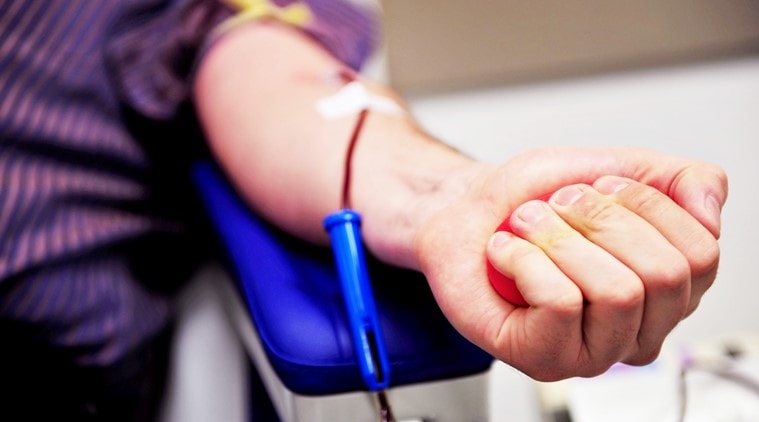In India, a donor must be between 18-65 years old with a minimum weight of 45 kilograms and normal body temperature.

In India, the need for blood arises every two seconds – it may arise due to surgery, heavy injury, or to treat a life threatening disease which requires blood components. India is the second most populous country in the world and ironically, while there is a need for 4 crore units of blood annually, only 40 lakh units are available. This huge gap can be reduced by donating blood and spreading awareness about blood donation to increase the number of donors.
Human blood is important to save lives. While it may sound intimidating, blood donation is quite safe and simple. However, there are a lot of myths and questions around the subject making it a daunting process for people to come forward and donate blood. Even though it is a simple process, blood donation has few rules and measures to ensure the safety of the donor as well as the receiver.
On World Blood Donor Day, which is observed every year on June 14, Dr Ainy Choonia, Head of Blood Bank, Saifee Hospital, shares a few important tips for donors to keep in mind. The theme for this year’s campaign is “Safe blood for all”.
*Check your eligibility: It is important to make sure that you match the donation eligibility criteria.
*In India, a donor must be between 18-65 years old with a minimum weight of 45 kilograms and normal body temperature.
*The haemoglobin level of the body is also an important factor to ensure eligibility. The ideal haemoglobin level to be able to donate blood should be more than 12.5 grams. It is checked by using a finger stick, prior to donating.
*People suffering from HIV/AIDS, Hepatitis B/C, Syphilis and diseases that are capable of being transmitted through blood transfusion cannot donate blood, while those who have a tattoo need to wait for at least a year to do the same.
*Blood donation can be done only once in 3 months.
*People who have had a history of malaria in the past 12 months should refrain from donating blood as the malaria causing parasite can lie dormant in the body for as long as a year.
*Diet and nutrition
The golden rule is to not donate blood on an empty stomach. A wholesome and nutritious meal must be consumed at least a couple of hours before donation, so that it can digest properly and can help in stabilising your blood sugar levels. Donating blood on an empty stomach may make you feel nauseous or uneasy post donation. Also, avoid being on a strict diet, especially if you are a regular donor.
*Rest and hydrate well
It has been observed that the primary cause of dizziness and fatigue after donating blood has been lack of sleep and hydration, which results in a drop in blood pressure. Therefore, it is essential to rest well, along with consuming plenty of water or juice (at least 2—3 glasses) before the blood donation process to keep the blood pressure stable.
*Inform of your medication
One must make it a point to bring a list of all the medicines consumed on the day of donating blood. It is important for the healthcare/medical provider to know of the same, as people taking certain acne medication, blood thinners, and antiplatelet medicines like Aspirin may be considered ineligible from donating blood. Individuals on antibiotic medication are also advised against blood donation, not because of the medication but because there is a risk that the illness or infection may get transmitted through blood.
*Rehydration is essential
Right after donating blood, it is possible to experience mild dizziness. For this reason, water, tea/coffee/juice and a light snack like biscuits are offered at almost all blood donation drives. Ensure that you rest for 10-15 minutes post donation and then consume these offerings in order to prevent low blood pressure.
*Avoid heavy workouts
It is recommended to stay away from strenuous exercise/activities or heavy lifting for a minimum of 24 hours after blood donation. Those whose work involve physical labour should ideally take a day or two off to rest well.
Refrain from alcohol consumption
Replenishing oneself with fluids like water and juices is ideal, ,but it is advised to avoid consuming alcohol for at least 12 hours post blood donation to prevent weakness.
Blood donation is a noble deed and a person can save upto three lives by donating blood just once. Lot of misapprehensions regarding the procedure being painful or complex, discourage people from donating blood. However, people need to be made aware of the benefits of donating blood which go beyond just saving lives.
Donating blood helps you in keeping track of your health with the help of the blood test taken prior to the donation. Blood donation burns calories and also reduces the risk of heart diseases. It also reduces the amount of about 225mg to 250 mg of iron from your body, reducing the risk of health complications like irregular heartbeat, muscle weakness, hardening of arteries, accelerated cholesterol oxidation, etc. which can occur due to high blood iron.
Source: Read Full Article
